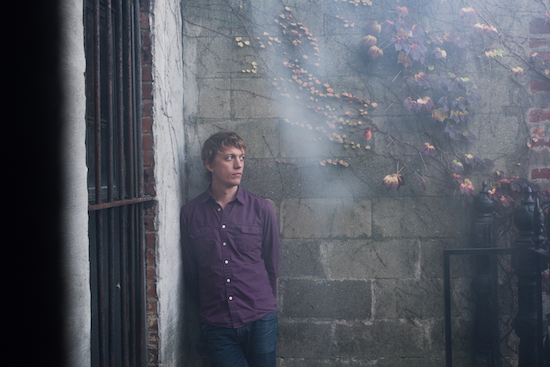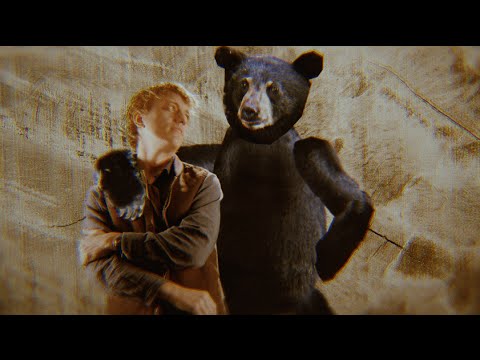Photograph courtesy of Shawn Brackbill
"I picked up a guitar today, and it was acoustic." Steve Gunn is answering the question of which instrument he turns to first when hit with the urge to tinkle away in his idle hours.
To listen to the New York guitarist and songwriter’s output over the last three or four years is to experience an artist who is neither any sort of folk purist, nor particularly experimental. And in this idiosyncratic, unhurried sound, electric accompanies acoustic with a warmth, synergy and sense of space arguably not heard in the so-called folk-rock domain since Ryan Adams’ Cold Roses. ‘Nature Driver’ from his latest album, Eyes On The Lines, is a lovely case in point. Hence the question.
"But I was playing it through an amplifier, so it was sort of electric I guess. I bought a guitar in Los Angeles, an old Hawaiian guitar from the ’30s that has a pickup installed, so I was testing what it sounded like through an amplifier. I play a lot alone, and I usually go to the acoustic first."
If that paints a picture of a solitary, reclusive man (he recalls himself as a "real bedroom child" when learning guitar in his teens), it belies the breadth of Gunn’s collaborations down the years. Aside from the well-documented fact he played with Kurt Vile’s Violators, Gunn recently worked with Mike Cooper on the splendid Cantos De Lisboa and took the production helm on the forthcoming album from the West Riding’s most illustrious folk adventurer, Michael Chapman. Then there are albums with Hiss Golden Messenger, the Black Twig Pickers, Shawn David McMillen…
These artists are all of a type, and give a firm indication as to Gunn’s tone. Though each album seems to emphasise some different characteristic – Eyes On The Lines offers unprecedented songwriting structure, while his earlier albums were sprawling instrumental intrigues with a heavy reliance on Eastern scales and tunings – critical consensus seems to place Gunn in the tradition of Chapman, Robbie Basho and Bert Jansch, while oft-repeated comparisons to the Grateful Dead rear their head when Gunn is plugged in (something exacerbated by the fact that Gunn’s singing voice bears some similarity to the understated but forever-chirpy tenor of Bob Weir).
Perhaps a more appropriate point of reference, particularly in relation to Eyes On The Lines and 2014’s Way Out Weather, is Richard Thompson, whose career is defined by Gunn-like qualities, such as the mellifluous combination of acoustic virtuosity and an electric sensibility that is both melodic and restrained. My introduction to Gunn’s music came with his 2013 record Time Off, specifically the opening track ‘Water Wheel’ with its repeated acoustic riff using one of Gunn’s preferred alternative tunings. This propulsive, meandering, occasionally nonchalant track seemed to showcase the sheer joy that Gunn takes in exploring the possibilities of melody and rhythm with his eclectic template, as well as what is a restless sense of pastoralism – something that defines all seven of his albums, in fact.
Cut to Eyes On The Lines‘ opener, ‘Ancient Jules’, and Gunn has very clearly evolved. His guitar melodies, which seem to circulate and snowball in intensity as they move through a song, are still to the fore, yet he has married this to a discipline and focus, both musically and lyrically, a result of a concerted study of the art of songwriting – something relatively new for someone who regarded himself solely as an instrumentalist until quite recently.
"I’ve learnt how to simplify things and not have songs go over the ten-minute mark. An LP is only 20-minutes-plus per side, so I want an album to be bookended, have a natural flow and an arc to the narrative. If you have a song that’s longer than ten minutes, it’s going to derail the whole picture.
"[In the past] I was trying to become this virtuosic player. I’m self-taught so I had this complicated way of navigating around a guitar, and now as a songwriter I feel that isn’t as important a role. It’s more about supporting the voice – so I tried to simplify certain things."
Time Off was the album that saw Gunn find his feet as a singer – the complication of vocals being another factor in reining in the sprawl that characterised his earlier works (the excellent Sundowner, from 2008, being the pick of these). "It took me some years of playing and performing to be able to project my voice and feel comfortable with it. As I started to sing I got more interested in the process of songwriting and I realised how challenging it really is. Some people can write songs effortlessly, but for me it takes a lot of work."
Gunn’s increasing interest and valuing of precision and simplicity can perhaps be traced back to an adolescence in thrall to hardcore and punk while growing up in Lansdowne, Pennsylvania. This is a surprisingly common tale among so-called folk musicians (Andy Cabic of Vetiver was a disciple of the Washington hardcore scene before a move to San Francisco revealed the joys of sitting beneath trees), and Gunn’s punk values live on – if not explicitly in his songs, certainly in his approach to the practicalities and economics of life as a musician.
As you would expect of someone who lists Skip Spence’s Oar among his favourite albums, Gunn is beholden to the elliptical, the homegrown and the unadorned, yet still the expansive and unfettered.
"I still try to stick by the DIY aesthetic. A lot of the time with logistics and things, the simpler the better; it’s easier and less expensive. I see that with certain bands who have very close-knit operations. For instance I was just on tour with Dinosaur Jr and they still hold true to this punk aesthetic – they have a small crew, they don’t have a huge amount of gear, everyone in their crew is someone they’ve been friends with a long time, they’re not spending money on props or lighting – everything is simplified.
"I always see the phrase that was coined by D. Boon of the Minutemen, ‘jamming econo’, and I feel that’s certainly important to me and my band."
At one point in his youth, skateboarding was also important to Gunn, though he didn’t buy into the culture entirely and admits he was "never a good skateboarder. I was pretty much a poser." Nevertheless, the sport/recreation/counter-cultural statement that is skateboarding played an important role in Gunn’s musical development. "It exposed me to different kinds of music. In skateboarding videos in the ’90s, skateboarders would use certain songs and some of them would try and push the envelope by using an old soul song or something. At the time I was listening to very formulaic, three-chord hardcore bands – I feel skateboarding pushed me in a different direction.
"Eventually I grew more interested in music and just decided to devote more time to that, and stay in my bedroom. Skateboarding bridged the gap from being a sports kid and being introduced to music."
There is, to say the least, some distance between Gunn’s solo work and the garish noise of many skateboarding videos. His strict bedroom regime for guitar innovation led him to embracing multiple alternative tunings, something he put down to the influence of both John Fahey ("some of his songs are very simple but his pacing and phrasing are what makes him unique") and Davey Graham ("he shone a lot of light on the DADGAD tuning, which I use a lot").
Many lesser guitarists may find the ‘drone’ created by such tunings as the reason for adopting them and opt not to take experimentation and exploration of the open tuning further. Gunn, like Fahey and Graham, makes sure he utilises the entire neck and every string when he is in, say, DADGAD; the melodic departures from any drone are such that often it’s not clear he is even using an open tuning. All this while hardly ever over-playing – the sense of space and looseness to his last three albums, while at the same time exhibiting his particular brand of virtuosity, is arguably their most striking appeal.
This quality of ambiguity is also threaded through his lyrics, which, as stated, achieved an unprecedented symmetry and poesy on Eyes On The Lines. Gunn has talked about the impact of Rebecca Solnit’s elegant, hopeful paean to the unknown and disorientation, her 2005 book A Field Guide to Getting Lost. His single ‘Conditions Wild’, with its anthropomorphically charming video, is his expression of Solnit’s ideas.
"One of the concepts of the album is the idea of embracing the unknown, and trusting the unknown. I feel like she conceptualised the ideas I was having in a way more interesting way than me. When I came across her book it aligned perfectly with what I had been thinking about – it pushed me further and it was inspiring that someone was coming up with such an interesting perspective on this concept."
Gunn prefaces almost every comment he makes with the words, "For me…", as if keen to ensure his experiences represent no universality and is careful not to be prescriptive. His gentle but confident music is similarly unassuming: suggestive of all of its influences, conveying a happy sense of bewilderment at nature and resulting from a studiousness that, while making for a somewhat cloistered childhood, is a rare advert for hard work.
Eyes On The Lines is out now on Matador. Steve Gunn’s European tour continues tomorrow at Kagelbanan in Stockholm, with the UK leg beginning on November 12 at the Hope & Ruin in Brighton; for full details and tickets, head here





